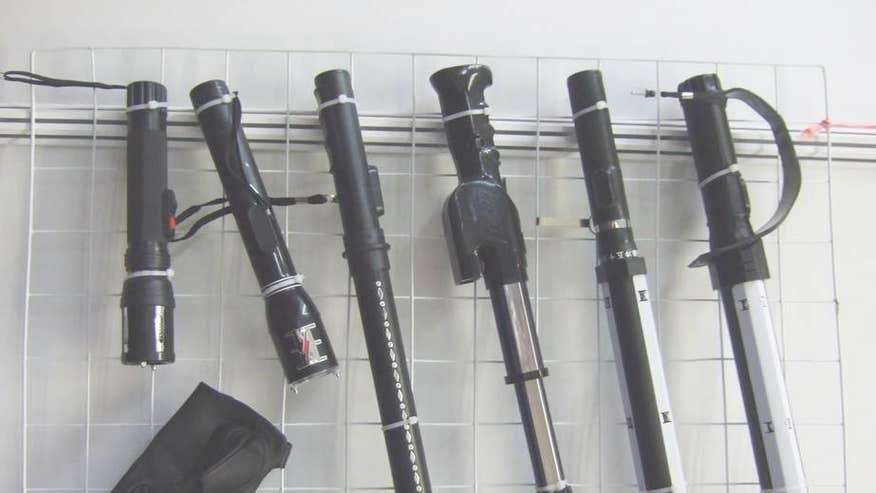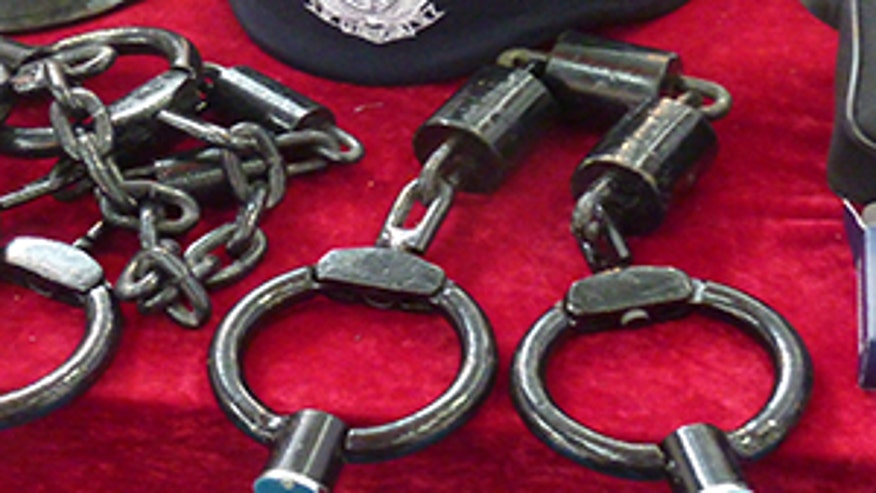-

Metal spiked batons are some of the tools of torture manufactured by more than 130 Chinese firms, human rights advocates say. (Courtesy: Amnesty International)
-

Electric shock batons, above, are inherently cruel and should be immediately banned by Chinese authorities, advocates say. (Courtesy: Amnesty International)
-

United Nations officials reportedly found weighted leg cuffs, seen above, on death row inmates in a Beijing prison in 2005. Some models weigh roughly 20 pounds. (Courtesy: Amnesty International)
Electric shock batons, weighted leg cuffs and restraint chairs are some of the “sickening devices” currently manufactured by more than 130 Chinese companies as part of a flourishing torture trade, up from just 28 firms 10 years ago, a new report finds.
The report by Amnesty International and the Omega Research Foundation — “China’s Trade in Tools of Torture and Repression” — found that China is the only country known to manufacture spiked batons or plastic batons with spiked metal heads, characterized by the report as intrinsically cruel and inhumane implements that should be immediately banned.
“Increasing numbers of Chinese companies are profiting from the trade in tools of torture and repression, fueling human rights abuses across the world,” said Patrick Wilcken, security trade and human rights researcher at Amnesty International. “This trade — which causes immense suffering — is flourishing because the Chinese authorities have done nothing to stop companies supplying these sickening devices for export or to prevent policing equipment falling into the hands of known human rights abusers.”
Some of the equipment manufactured in China can have legitimate law enforcement use, such as tear gas and riot-control vehicles, but advocates say there’s substantial risk that other, more ominous devices can contribute to human rights violations elsewhere.
“[Police] used an electric baton on my face — it’s a kind of torture the police call ‘bengbao popcorn’ because your face splits open and looks like popped corn. It smelled horrible, the smell of burning skin.”
– Unidentified Chinese torture survivor
During the mid-1990s, genocide and brutal civil wars in Rwanda, Sudan and Burundi killed millions in Africa, and many people were killed by machetes that were manufactured by China, France, Iran, Iraq, Russia and elsewhere.
More recently, a large consignment of Chinese “anti-riot” equipment was exported to Uganda in February 2011. Two months later, Ugandan security officials deployed the devices to suppress protesters against the rising cost of living in the landlocked country in East Africa. In all, at least 9 people were fatally shot, more than 100 others injured and roughly 600 were detained.
Chinese anti-riot equipment, according to the report, was also used to squash dissidents in the Democratic Republic of Congo during its 2011 election. At least 33 people were killed and another 83 were injured.
One firm in particular — China Xinxing Import/Export Corporation — that specializes in thumb cuffs, restraint chairs and electric shock stun guns reported in 2012 that it has ties to more than 40 African countries, or an estimated $100 million in annual trade.
Chinese-manufactured electric shock batons are also believed to be currently used by police forces in Ghana, Senegal, Egypt and Madagascar, according to the report.
Doug Bandow, a senior fellow at Cato Institute, a Washington-based think tank, told FoxNews.com he saw no evidence of the torture devices during his visit to China last year. But he acknowledged the country’s stated desire to tap into Africa, particularly in war-torn countries like Sudan, and the demand by some foreign governments for Chinese-manufactured spiked batons, which are reportedly exported to security forces in Nepal and Thailand.
“I suppose the government could be saying we need companies to produce this, but I’m skeptical they would have an export promotion policy because that would highlight their own dubious human rights practices,” Bandow said. “I assume there’s demand out there by some foreign governments, that would be my presumption.”
While Amnesty International and the Omega Research Foundation are urging Chinese authorities to impose an immediate ban on production and trade of “inherently abusive” equipment, Bandow said he doesn’t expect swift action.
“I see no evidence that that’s a campaign they’re interested in,” he told FoxNews.com. “If a bit of attention comes to the issue, they might. It’s one thing to sell things if no one’s aware, but presumably what the Chinese government can do is halt the business. There can still be covert production, of course.”
Derek Scissors, a scholar at the American Enterprise Institute, where he studies Asian economic issues and trends, noted that the overall number of companies registered in China has increased by more than 20 million in the past decade, compared to the number of firms involved in the torture trade increasing from 28 to 130.
“And the volume of Chinese exports has quadrupled in the last decade, past $4 trillion,” Scissors wrote FoxNews.com. “The data don’t matter to the moral part of this. But this isn’t a booming trade area for the PRC — it’s actually so small that the central government may not have noticed.”
The report also calls on Chinese authorities to immediately suspend or deny trade licenses for the supply of equipment to law enforcement agencies if there’s a substantial risk it will be used to commit human rights violations.
“There is no excuse whatsoever for allowing the manufacture and trade in equipment for which the primary purpose is to torture or inflict cruel, inhuman or degrading treatment on people,” Wilcken said. “These heinous acts are totally banned under international law and Chinese authorities should immediately place a ban on the production and trade in such cruel and inhumane devices.”
One of those devices, the electric stun baton, is openly advertised by 29 Chinese firms, according to the report, allowing security officials to administer painful and multiple shocks to sensitive areas of the body, including the genitals, throat and groin without leaving permanent scars.
“[Police] used an electric baton on my face — it’s a kind of torture the police call ‘bengbao popcorn’ because your face splits open and looks like popped corn,” one Chinese torture survivor told Amnesty International. “It smelled horrible, the smell of burning skin.”

